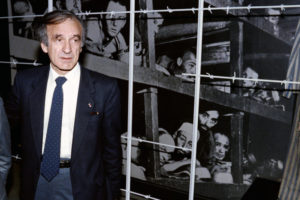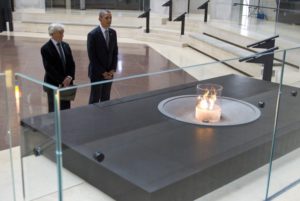Elie Wiesel, the Auschwitz survivor who became an eloquent witness for the six million Jews slaughtered in World War II and who, more than anyone else, seared the memory of the Holocaust on the world’s conscience, died on Saturday at his home in Manhattan.
It was this speaking out against forgetfulness and violence that the Nobel committee recognized when it awarded him the peace prize in 1986.
(New York Times, July 2, 2016)
 Elie Wiesel embodied the triumph of the human spirit. And, like Mahatma Gandhi and Nelson Mandela, he walked like a moral giant among us.
Elie Wiesel embodied the triumph of the human spirit. And, like Mahatma Gandhi and Nelson Mandela, he walked like a moral giant among us.
Therefore, it is yet another indictment of public consciousness that his death did not evoke the emotional outpouring recent celebrity deaths did. In my case, this might be because the only way Wiesel figured in my life was, ironically, in the context of my decrying the “forgetfulness and violence” he spent his life trying to prevent.
Neither the sublime admonitions of Elie Wiesel nor the celebrated entreaties of George Clooney [will] prevent a single person from being slaughtered in Darfur.
(“Save Darfur Rally: Full of Sound and Fury Signifying Nothing!” The iPINIONS Journal, May 2, 2006)
To be fair, nobody seemed more mindful of how doomed we are to repeat the mistakes of the past than Wiesel. For, even though unwilling to concede the possibility of another Holocaust, he continually bemoaned man’s inhumanity to man (e.g., in places like Cambodia, Rwanda, Darfur, and Bosnia) as evidence of the recurring Night he famously wrote about.
Incidentally, man does not require the cover of armed conflict (whether caused by nationalism, sectarianism, tribalism, or racism) to perpetrate this inhumanity – as Wiesel could personally attest:
‘ ‘Psychopath’ — it’s too nice a word for him,’ Mr. Wiesel said in his first public comments on Mr. Madoff and the Ponzi scheme he is accused of perpetrating on thousands of individuals and charities, including the Elie Wiesel Foundation for Humanity…
Mr. Wiesel’s charity lost $15.2 million, and he and his wife, Marion, lost their life savings. ‘This was a personal tragedy where we discovered all of a sudden what we had done in 40 years — my books, my lectures, everything — was gone,’ said Mr. Wiesel.
(New York Times, February 26, 2009)
The irony is too rich for words….
 In any event, given that human events always defied all Wiesel championed, it might seem a contradiction that he won the Nobel peace prize. Except that it makes perfect sense when one considers that Barack Obama won the peace prize in 2009 for nothing but the hope for peace, which human events have since duly defied.
In any event, given that human events always defied all Wiesel championed, it might seem a contradiction that he won the Nobel peace prize. Except that it makes perfect sense when one considers that Barack Obama won the peace prize in 2009 for nothing but the hope for peace, which human events have since duly defied.
Meanwhile, there’s no accounting for the media dedicating ten times more coverage to the death of Muhammad Ali, the self-proclaimed “greatest,” than to the death of Elie Wiesel, a universally acclaimed great man. Then again, this is the same media that routinely dedicates ten times more coverage to terrorist attacks in cities in the West than to terrorist attacks in cities in the Middle East.
I know Wiesel decried the latter even more than I did in “Global Outpouring for Paris Makes Beirut Feel ‘Forgotten,’” November 16, 2016. But his modesty was such that I doubt the former will have him rolling over in his grave.
We may be doomed to learn too little from the mistakes of the past. But we would be wise to never forget Wiesel.
He was 87.
Related commentaries:
Save Darfur…
Obama Nobel…